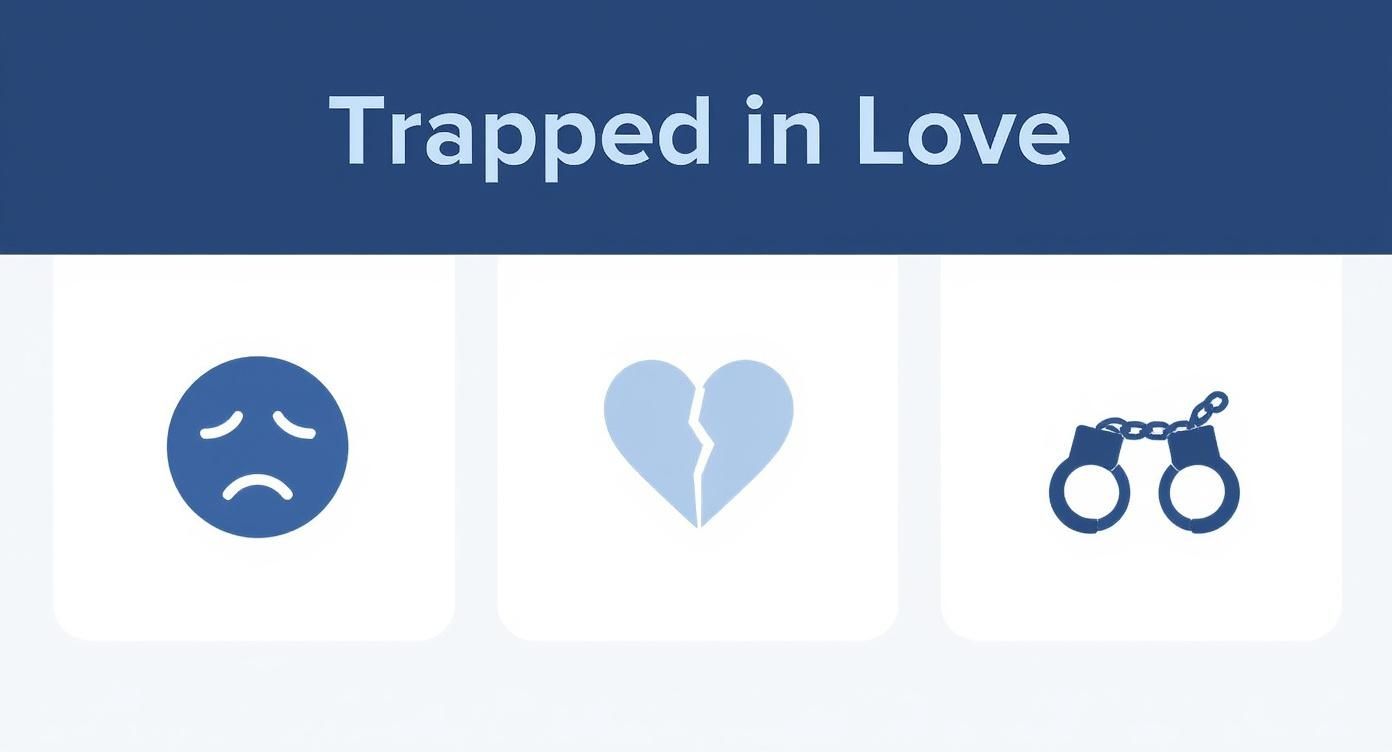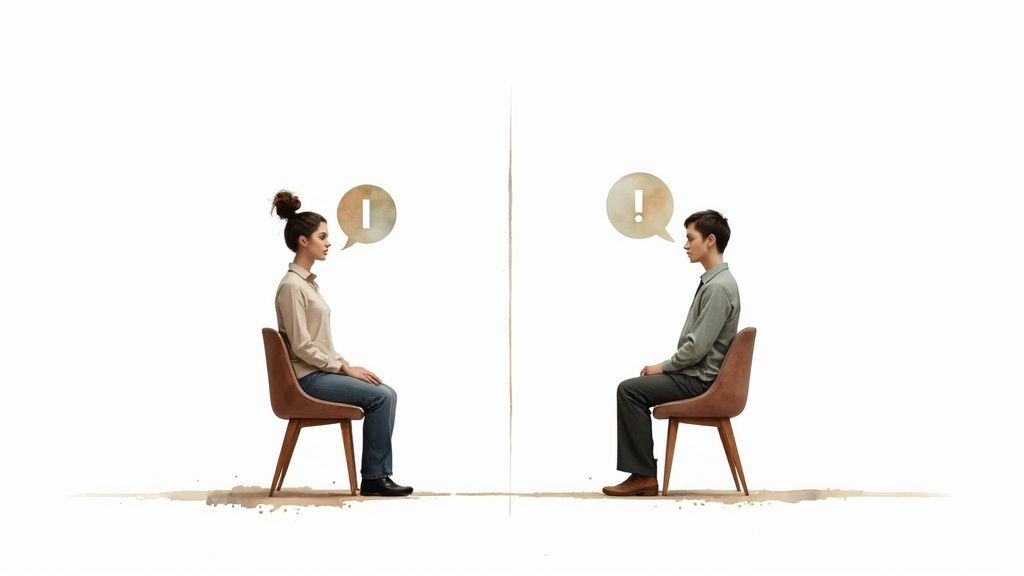Feeling trapped in a relationship is a deeply unsettling experience. It's more than just a rough patch; it’s a persistent mix of obligation, fear, and a quiet dissatisfaction that makes you wonder if this is all there is. It's the sense that your personal growth has been put on hold and your happiness is no longer a priority.
This feeling is a critical signal that something fundamental in your partnership needs serious attention.
Understanding Why You Feel Stuck in Your Relationship
If this sounds familiar, you're not alone. This heavy emotion often creeps in slowly, replacing the initial excitement of the relationship with a dull sense of routine and confinement. You might find yourself daydreaming about a different life or feeling a constant, low-level anxiety when you think about your future with your partner.
This isn't just about being bored. It's a profound sense of losing yourself within the partnership. Recognizing these emotions for what they are is the first, crucial step toward clarity. Many people brush these feelings aside, blaming work stress or just a temporary phase. But when that trapped sensation becomes your default state, it's a sign of deeper issues that won't just fix themselves.
The Underlying Causes of Feeling Trapped
The reasons you feel this way are usually complex, often stemming from a messy combination of relationship dynamics, personal circumstances, and even external pressures. It’s the perfect storm for discontent.
Some of the most common factors I've seen contribute to this feeling include:
- Communication Breakdowns: When you can no longer talk about the important stuff without it turning into a fight, or you just avoid it altogether, a wall starts to build between you.
- Unmet Emotional Needs: Feeling unheard, unappreciated, or unsupported by the one person you're supposed to count on leads to a deep sense of isolation within the relationship itself.
- Loss of Personal Autonomy: Have your hobbies, friendships, and personal goals been pushed to the back burner for the sake of the relationship? It's only natural to feel confined when your world has shrunk.
- Financial Dependence: Money is a huge one. It can create a very real, practical trap that makes leaving feel impossible, even when you're emotionally ready to walk away.
The infographic below zeroes in on three common areas—general dissatisfaction, unhappiness in your sex life, and financial pressure—that frequently fuel that feeling of being stuck.

This visual really highlights how emotional, physical, and practical pressures can combine to create a powerful sense of confinement. It's interesting to see that while many people might report general satisfaction on the surface, digging into specific areas like intimacy and finances reveals a much deeper unhappiness.
For instance, while a surprising 82.7% of people report being satisfied with their relationship overall, a much lower 59% are actually happy with their romantic or sex life. Money is another major stressor, with nearly half of millennials admitting they've stayed in a relationship because of their financial situation. You can explore more data on relationship dynamics to better understand the factors that influence partner satisfaction.
Figuring Out Why You Feel So Confined

To find a way out, you first have to look inward. You need to get brutally honest about the specific dynamics that are making you feel this way. Just knowing you feel trapped isn't enough—the real power comes from pinpointing why. This feeling rarely pops up from a single issue; it’s usually a messy mix of your own internal shifts and external pressures from the relationship itself.
For many, that feeling of being boxed in starts quietly. It often begins with a slow erosion of personal identity.
Think back to who you were before this relationship. What happened to the hobbies that used to light you up? Where did those friendships go? We often give up little pieces of ourselves for a partnership without even realizing it, only to wake up one day and not recognize the person in the mirror.
It's almost inevitable that you'll feel stuck when your own needs consistently go ignored. Research on couples highlights that while satisfaction can swing day-to-day, it finds its footing when partners regularly notice and meet each other's emotional needs. When that doesn't happen, you end up feeling trapped in a negative cycle, often fueled by emotional dependency or even societal expectations. You can discover more insights on how emotional needs impact relationship stability.
Unpacking the Relationship Dynamics
Looking beyond yourself, the way you and your partner interact is often the biggest source of that trapped feeling. These patterns can be incredibly subtle at first, but over time, they grow more and more restrictive, chipping away at your sense of freedom.
Do any of these common patterns sound familiar?
- Codependency: Is your mood entirely dependent on your partner's? Codependency blurs the lines, making you feel like you can't function on your own. It’s an unhealthy dynamic where autonomy gets lost.
- Power Imbalances: Does one person call all the shots? When your opinion is constantly overlooked or you have no real say in your shared life, it creates a suffocating power dynamic that leaves you feeling small.
- Lack of Mutual Respect: Respect is the bedrock of a healthy partnership. If you feel unheard, belittled, or constantly criticized, the relationship starts to feel more like a prison than a safe space.
Over time, these dynamics can slide into something more damaging. If you think the problems run deeper, it’s a good idea to explore the common signs of a toxic relationship to get a clearer picture.
It often boils down to one simple question: "Do I feel like an equal partner, or am I just playing a role in someone else's life?" Answering that honestly is a huge step toward understanding where that feeling of confinement is coming from.
When Unmet Expectations Make You Feel Trapped
That feeling of being stuck often comes from the massive gap between the relationship you thought you’d have and the one you’re actually in.
Maybe you pictured a partner who would champion your career goals, but instead, you feel held back. Or perhaps you craved a deep emotional connection and all you get is a wall of silence.
When these fundamental expectations aren't met, resentment starts to build. This isn't about pointing fingers and blaming your partner for everything. It's about recognizing that there's a major disconnect. Gaining that self-awareness is your first real step toward taking meaningful action to get your freedom—and your happiness—back.
Reclaiming Your Autonomy and Sense of Self

Realizing you feel trapped is a huge first step. The good news is, now you can start doing something about it. The goal here isn't to pull away from your partner, but to rebuild a stronger, more complete version of yourself within the relationship.
This all starts with small, deliberate actions. It's about intentionally carving out space that is just for you. When you feel like you've lost yourself in a relationship, your world can feel like it's shrunk down to just one other person. Expanding it again, even a little bit, is incredibly empowering and can start to break down that feeling of being boxed in.
Reconnecting with Your Core Self
Think back for a minute. What did you love to do before this relationship? Who did you love spending time with? These are often the first things that get pushed to the side when a partnership becomes all-consuming. Making a real effort to bring them back into your life is a game-changer.
Here are a few practical ways to get started:
- Schedule "You" Time: Look at your calendar right now and block out one evening a week or a couple of hours on the weekend. This is your non-negotiable time to read, take a long walk, or just sit and do absolutely nothing.
- Rekindle Old Friendships: Shoot a text to that friend you haven't talked to in ages. Reconnecting with people who knew you before reminds you of who you are outside of your romantic role.
- Rediscover a Hobby: Did you used to paint, play guitar, or go hiking? Set aside just 30 minutes this week to dive back in. It might feel small, but it's a powerful way to reclaim your identity.
This isn't just about what you do; it's also about who you are. To really get your sense of self back, you need to get clear on your core values. Using tools like these journal prompts to discover your core values can offer some serious clarity on what actually matters to you, helping you make choices that feel more authentic.
Building Healthy Independence
A big part of reclaiming your autonomy is cutting down on emotional dependency. It's easy to feel trapped when your self-worth is completely tied to your partner's approval and moods. When you start building a stronger sense of self, you create a much healthier dynamic where you feel secure on your own two feet. If this resonates, you might want to learn more about how to stop being needy in a way that actually builds mutual respect.
Taking steps to nurture your own fulfillment isn't selfish—it's essential for your well-being and the health of any partnership. A relationship thrives when it's made up of two whole individuals, not two halves trying to complete each other.
By investing in your own growth, you’re doing more than just shaking off that trapped feeling. You’re bringing a more vibrant, confident, and interesting person back to the table, and that renewed energy can be the very thing that transforms your relationship for the better.
How to Communicate and Set Healthy Boundaries

This is where the real work begins. Effective communication is your best tool for tearing down the walls that make you feel trapped. The idea of opening up can feel terrifying, I know. But staying silent is a surefire way to keep things exactly as they are.
The goal here isn't to start a fight—it's to start a conversation. You need to shift your mindset from confrontation to collaboration.
It’s about sharing your feelings in a way that invites your partner to understand you, not just defend themselves. When people feel attacked, they shut down. But when you can share your experience without pointing fingers, you create a small opening for real connection. That's where problem-solving can finally begin.
Swap Accusations for "I Feel" Statements
One of the simplest, yet most powerful, changes you can make is switching from accusatory "you" statements to more vulnerable "I" statements. Think about it: when someone starts a sentence with "You always…" or "You never…", what's your immediate reaction? You probably get defensive. It’s human nature.
Let's look at the difference in action:
- The Accusation ("You" Statement): "You never give me any space. You're always smothering me."
- The Expression ("I" Statement): "Lately, I've been feeling really overwhelmed and I need some time to myself just to recharge."
See how the first one lands like a punch? The second one is just an honest statement about your own needs. "I" statements aren't about being soft; they're about being crystal clear and taking ownership of your emotional state. They communicate the impact a situation is having on you without making it a personal attack.
Setting—and Defending—Your Boundaries
Boundaries are the invisible lines we draw that teach people how they can treat us. They are not punishments or ultimatums; they are an act of self-respect. Feeling trapped is often a giant red flag that your boundaries have been repeatedly ignored or were never put in place to begin with.
Setting a boundary is a skill, and like any skill, it takes practice. You have to be clear, firm, and most importantly, consistent.
A boundary isn’t about controlling someone else’s behavior. It’s about choosing how you will respond when your limits are crossed. It’s about protecting your own peace.
So, what does this look like in the real world?
Let’s say you need uninterrupted time for a hobby you love. A clear boundary might sound like this: "I’m going to spend Tuesday evenings working on my painting. I would really appreciate it if I could have that time to myself without any interruptions."
If your partner comes in and interrupts, you don't start an argument. You just gently enforce the boundary: "I'd love to talk about this with you as soon as I'm done at 9 PM."
This is a huge topic, and if you want to dive deeper, our guide on how to set healthy boundaries is a great place to start. By clearly communicating your limits and consistently upholding them, you start teaching others how to treat you, reclaiming your personal space and your freedom in the process.
This is the part no one wants to get to. After weeks, months, or even years of that trapped feeling, you eventually land at a crossroads. Making a choice here demands a level of honesty and courage that feels almost superhuman.
This isn’t about winning a fight or deciding who’s to blame. It’s about honoring yourself and being brutally realistic about what your future can and should look like. There’s no easy formula, just a quiet, thoughtful evaluation of your relationship and whether a path forward together is even possible—or healthy.
It all starts with asking yourself some incredibly tough questions.
The Make-or-Break Questions to Ask Yourself
Before you can see the path forward, you have to get honest about the ground you're standing on. Are we talking about a few cracks in the foundation, or has the whole structure crumbled beyond repair?
Find some quiet time, grab a journal, and really dig into these points.
- Have Our Core Values Diverged? Think about the big stuff—the things that truly matter to you at your core. Honesty, family, ambition, how you treat people, what you want out of life. Do you and your partner still see eye-to-eye on these, or are you pulling in fundamentally opposite directions?
- Is My Partner Genuinely Willing to Do the Work? This is huge. You’ve probably brought up your feelings before. How did they react? Did they listen? Real change isn’t just saying "I'm sorry." It’s a partner who is actively willing to put in the effort, and that often means being open to things like therapy.
- Do I Feel Emotionally Safe? Can you be your messy, vulnerable, authentic self without bracing for impact? A relationship without emotional safety—where you can't express a feeling without it being dismissed or turned back on you—will always feel like a cage.
- What Does My Gut Tell Me? This is the most important question of all. When you strip away all the noise—the fear of being alone, the money worries, what your family will think—what is your intuition screaming at you? Deep down, our gut knows the truth long before our brain is ready to deal with it.
One of the most telling signs is the feeling of relief. When you allow yourself to imagine a future without your partner, what's the primary emotion? Is it a gut-wrenching sense of loss, or is it a quiet, liberating exhale? That feeling is your most honest guide.
When to Consider Couples Therapy
If there’s still a flicker of hope and—this is key—both of you are willing to try, couples therapy can be a game-changer. It’s not about finding a referee for your fights. It's about having a neutral third party who can help you have conversations that are simply too loaded to have on your own. A good therapist can give you the tools to break out of those toxic communication loops and get to the root of the problem.
Bringing it up is delicate, though. Frame it as a team effort, not an ultimatum. Instead of, "We need therapy, or I'm leaving," try something like, "I love you, and I desperately want us to be happy again. I think talking to someone could help us figure out how to get back to each other."
Acknowledging the Fear of Leaving
Let's be real: deciding to leave is terrifying. The fear isn't just some vague anxiety about the unknown. It’s a collection of very real, practical worries that can keep you stuck long after you know it's over.
These fears probably sound familiar:
- Financial Insecurity: "How on earth will I afford to live on my own?"
- Loneliness: "What if I never find anyone else and end up alone forever?"
- Judgment: "What are our friends and family going to say?"
- Guilt: "Am I ruining their life by doing this?"
These are all valid. But they can't be the bars of the cage that keeps you in an unhappy, unhealthy situation. The only way through them is to face them head-on. Start by building a support system. Confide in one trusted friend. Take a quiet look at your finances.
And most importantly, remind yourself over and over that choosing your own well-being is not selfish. It's necessary.
Common Questions About Feeling Trapped
When you're navigating that heavy, complicated feeling of being stuck in a relationship, a million questions probably run through your mind. Let's tackle some of the most common ones to give you a bit more clarity.
Is It Normal to Feel Trapped Sometimes?
Yes, it's totally normal to have fleeting moments of feeling a bit boxed in, especially during stressful times or after a silly argument. Life can get overwhelming, and it’s easy to let those feelings spill over onto your relationship.
But here’s the crucial difference: it’s all about duration and intensity. A rough patch that passes is one thing. A constant, nagging feeling that you’re stuck, one that lasts for weeks or months, is a giant red flag. If "trapped" has become your new normal, it’s a sign that your fundamental needs for respect, freedom, or connection are being consistently ignored.
Can We Fix a Relationship if I Feel Trapped?
Absolutely. But—and this is a big but—it takes a real, active commitment from both of you. This can't be a one-person show.
The whole process kicks off when you voice how you feel, using those "I feel" statements we talked about earlier. For there to be any shot at fixing things, your partner has to be willing to actually listen without getting defensive and jump in to help change the dynamic. Honestly, this kind of work is often most successful with a couples therapist who can act as a neutral guide. The most important ingredient, though, is a genuine, shared desire to do the work.
The real question isn't just, "Can this be fixed?" It's, "Are we both truly willing to try?" If the answer from either of you is no, well, you have your answer about the relationship's future.
How Do I Know if It Is the Relationship or Just My Fear of Being Alone?
This is such a critical question, and it's tough to untangle. The fear of being on your own is a powerful force that can keep you anchored in a situation that’s making you miserable.
Try this little visualization exercise. Close your eyes and really imagine your life five years from now if nothing changes in your relationship. How does that picture make you feel in your gut? Now, picture your life in five years if you were on your own, free to build the life you want. Which of those scenarios brings a sense of relief?
While the fear of being alone is real, if the thought of staying feels more suffocating than the thought of leaving, the problem is almost certainly the relationship itself. When you’re weighing this kind of decision, it can be really helpful to get a clear picture of the challenges involved by understanding the hurdles to ending a marriage.
At Poke Match, we believe everyone deserves to feel free and fulfilled in their connections. Explore our extensive library of articles for more expert advice on building healthier, happier relationships.
